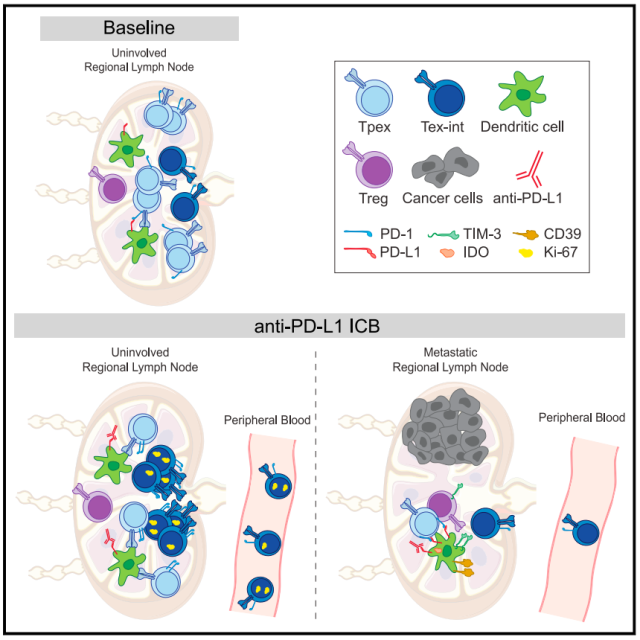Subversive discovery: Can lymph nodes promote the success of cancer immunotherapy?
- Normal Liver Cells Found to Promote Cancer Metastasis to the Liver
- Nearly 80% Complete Remission: Breakthrough in ADC Anti-Tumor Treatment
- Vaccination Against Common Diseases May Prevent Dementia!
- New Alzheimer’s Disease (AD) Diagnosis and Staging Criteria
- Breakthrough in Alzheimer’s Disease: New Nasal Spray Halts Cognitive Decline by Targeting Toxic Protein
- Can the Tap Water at the Paris Olympics be Drunk Directly?
Subversive discovery: Can lymph nodes promote the success of cancer immunotherapy?
- Should China be held legally responsible for the US’s $18 trillion COVID losses?
- CT Radiation Exposure Linked to Blood Cancer in Children and Adolescents
- FDA has mandated a top-level black box warning for all marketed CAR-T therapies
- Can people with high blood pressure eat peanuts?
- What is the difference between dopamine and dobutamine?
- How long can the patient live after heart stent surgery?
Subversive discovery: Can lymph nodes promote the success of cancer immunotherapy?
During cancer treatment, lymph nodes near the tumor are usually removed as a side-step to prevent the presence of metastatic cancer cells in these lymph nodes, which can lead to cancer metastasis.
The emergence of cancer immunotherapy, especially the immune checkpoint therapy represented by PD-1/PD-L1, has changed the pattern of cancer treatment.
But only a small fraction of patients with solid tumors currently respond to immunotherapy, and most immunotherapy aims only to reactivate T cells in tumors, which are often exhausted in the battle against tumor cells.
The lymph node itself is also a key location for the survival and activation of T cells. So, will the removal of lymph nodes during cancer immunotherapy affect the effect of immunotherapy?
On March 16, 2023, researchers from the University of California, San Francisco published a research paper titled: Dynamic CD8+ T cell responses to cancer immunotherapy in human regional lymph nodes are disrupted in metastatic lymph nodes [1] in the journal Cell .
This human clinical study in head and neck cancer patients shows that keeping lymph nodes intact until the end of immunotherapy can improve the efficacy against solid tumors. This latest study suggests that allowing activation of the immune response in the lymph nodes during immunotherapy could further drive the positive response to immunotherapy.

Professor Matthew Spitzer , the corresponding author of the paper , said that in cancer treatment, lymph nodes are usually removed because they are often the place where metastatic cancer cells first appear.
Without surgical removal, it is difficult to determine whether lymph nodes contain metastatic cancer cells. This latest study makes us rethink the importance of preserving lymph nodes during treatment.
He also said that the purpose of immunotherapy is to initiate an immune response, but when we remove nearby lymph nodes before treatment, we actually remove a critical location where T cells survive and can be activated.
The evidence in favor of lymph node removal comes from earlier studies before the advent of immunotherapy.
Researchers have long believed that cancer immunotherapy works by stimulating immune cells within tumors.
A study published in Cell by Matthew Spitzer’s team in 2017 showed that immunotherapy drugs are actually activating lymph nodes [2] .

Unlike immunotherapy, which boosts T cells in tumors, T cells in lymph nodes may be the source of circulating T cells in the blood. These circulating T cells can enter the tumor and kill the tumor cells.
Studies in mouse models have demonstrated that intact lymph nodes can suppress cancer development.
Now, the research team wants to further explore whether preserving lymph nodes can also help in the treatment of human cancer patients.
They selected patients with head and neck cancer for the study because they have the highest number of lymph nodes near the tumor.
The research team recruited 12 head and neck cancer patients whose tumors had not metastasized to the lymph nodes. Typically, these patients undergo surgery to remove the tumor and possibly other treatments.
In the study, the patients were treated with the immunotherapy drug atezolizumab , a PD-L1 monoclonal antibody developed by Genentech.
After a week or two of treatment, the research team measured how the immunotherapy activated the patient’s immune system.
The research team removed each patient’s tumor and nearby lymph nodes after immunotherapy, and analyzed the effect of immunotherapy on the tumor and nearby lymph nodes.
The results showed that after immunotherapy, anti-tumor T cells in the lymph nodes began to play a role, and they also found that the number of CD4 T cells in the peripheral blood of patients increased.
This suggests that intratumoral and systemic immune activation is evident after effective immunotherapy.

Being able to surgically collect tissue shortly after a patient’s immunotherapy is a unique opportunity to observe the effects of treatment on the immune system at the cellular level, the research team said.
Another strength of the study design is that it allowed the researchers to compare how treatments affected lymph node metastasis or secondary tumor growth.
No one had looked at metastatic lymph nodes this way before, and this study allowed us to see that metastasis impairs the immune response compared to what we see in healthy lymph nodes.
According to the research team, this may be because T cells in these metastatic lymph nodes are less activated by immunotherapy. If so, that could partly explain the poor performance of some immunotherapies.
Nonetheless, immunotherapy induced sufficient activity of T cells in the metastatic lymph nodes, so it may be considered to preserve the lymph nodes for a short period of time before the end of immunotherapy.
Professor Matthew Spitzer , the corresponding author of the paper , said that it may still be important to remove lymph nodes with metastatic cancer cells, but removing these lymph nodes before immunotherapy may be like throwing the baby out with the bath water after saving the baby from the bath.
If a good immune response can be activated before the tumor is removed, all of these T cells will remain in the body, recognizing and preventing the cancer from recurring .
Next, the research team plans to investigate better treatments for patients with metastatic lymph nodes, using drugs that more effectively reactivate the lymph nodes’ immune response.
Paper link :
https://doi.org/10.1016/j.cell.2023.02.021
https://doi.org/10.1016/j.cell.2016.12.022
Subversive discovery: Can lymph nodes promote the success of cancer immunotherapy?(source:internet, reference only)
Disclaimer of medicaltrend.org
Important Note: The information provided is for informational purposes only and should not be considered as medical advice.



